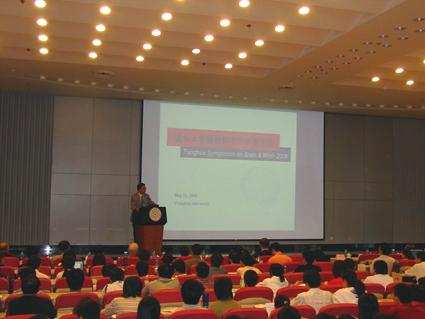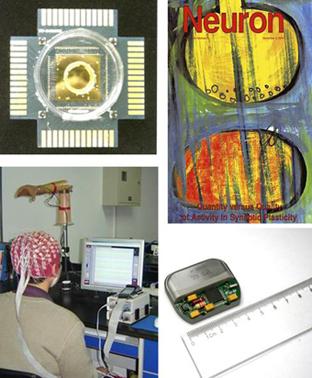Tsinghua Symposium on Brain and Mind 2006

The Tsinghua Symposium on Brain and Mind 2006, organized by the Tsinghua University Center for Brain and Mind Initiatives, was held in the Main Building on May 21.
The symposium, which featured academic reports by renowned scientists and experts in brain study, included Professor Walter J. Freeman from University of California at Berkeley, Professor Wang Xiaoqin from Johns Hopkins University, academician Chen Lin, academician Guo Aike, and academician Han Jisheng from the Chinese Academy of Sciences, attracted over a hundred teachers and students from Tsinghua University, Peking University, and the Chinese Academy of Sciences.
Tsinghua Vice President Gong Ke addressed the opening ceremony. He noted that Tsinghua plans to establish and develop a multi-disciplinary system of brain and mind study over the next three to five years. Vice President Xie Weihe met and talked with the representatives who gave reports at the symposium. He exchanged ideas with the participants on the development of the Tsinghua University Center for Brain and Mind Initiatives.

To better know the secret of human thinking has always been a goal for scientists. In recent years especially, the development of various neural imaging technologies and neural information processing techniques has enabled researchers to overcome limitations and to explore more deeply neural functions. As a result, a complete research system, from the cellular level to the behavioral level was established. Major contributions to this research system were made by molecular, cellular, computational neuroscience, and cognitive neuroscience.
Tsinghua University sponsors significant research in the area of brain studies. In the field of neurobiology, Professor Guosong Liu, from School of Medicine, successfully explored the mechanism of noise suppression of neural computation at the level of neural circuitry, by screening the synaptic change of cultured neurons from rats.
As been told, his research goal is to develop certain kind of medicine for the treatment of the neural degeneration. While, in the field of neural engineering, Professor Shangkai Gao from the Department of Biomedical Engineering, School of Medicine, is leading a research group to develop advanced neural information processing methods to read the ongoing human minds under certain experimental paradigm, for implementing a brain-computer interface to help people operate computers and home appliance just by will and thought.
Her group has won several top prizes in the international brain computer interface competition during past years. Professor Luming Li s lab in the School of Aerospace is making progress of developing unique deep brain stimulators for the treatment of neural diseases like Parkinson s disease, epilepsy and drug addiction.
A research team from Professor Jing Chen s biochip laboratory in the Department of Biomedical Engineering, School of Medicine, successfully designed and manufactured a neural chip for detecting activities of cultured neurons and neural network.
(http://news.tsinghua.edu.cn)
[update:2006-05-24]
[read:3113]





